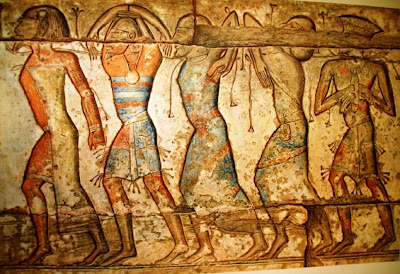Moses assures his people they will be freed from slavery, extracted from Egypt with God's outstretched arm, and brought to the land of their ancestral inheritance. The people balk:
| וְלֹא שָׁמְעוּ אֶל מֹשֶׁה מִקֹּצֶר רוּחַ וּמֵעֲבֹדָה קָשָׁה |
"...but they did not listen to Moses, out of shortness of spirit and hard labor." (Ex 6:9) |
Rashi understands the phrase "they didn't listen to Moses" to mean:
| לא קבלו תנחומין |
"They did not accept [his] words of consolation." |
But is what Moses says really "consolation?" He essentially tells the people that everything is going to be okay. Which pretty much flies in the face of all conventional wisdom about how to offer consolation. When you go to a shiva house, you don't pronounce that everything is going to be okay. Because it's not "okay." Far better to simply be there with the mourner, listen to them. Something more along the lines of what God tells Moses just a few verses earlier:
| אֲנִי שָׁמַעְתִּי אֶת נַאֲקַת בְּנֵי יִשְׂרָאֵל אֲשֶׁר מִצְרַיִם מַעֲבִדִים אֹתָם |
"I have heard the moans of the children of Israel, whom the Egyptians are enslaving" (6:5) |
Or earlier, at the burning bush:
| רָאֹה רָאִיתִי אֶת עֳנִי עַמִּי אֲשֶׁר בְּמִצְרָיִם וְאֶת צַעֲקָתָם שָׁמַעְתִּי מִפְּנֵי נֹגְשָׂיו כִּי יָדַעְתִּי אֶת מַכְאֹבָיו |
"I have indeed seen the affliction of my people in Egypt, and I have heard their cry on account of their taskmasters, for I know their pains." (3:7) |
Or simply:
| וַיַּרְא אֱ-לֹהִים אֶת בְּנֵי יִשְׂרָאֵל וַיֵּדַע אֱ-לֹהִים |
"God saw the children of Israel, and God knew." (2:25) |
This sounds more like what we typically think of as consolation - acknowledging, listening, being there, and thereby easing people's emotional burden. Yet these verses are either in the narrative of the text, or part of the dialog between God and Moses. They're not included in what Moses is supposed to tell the people.
 |
| Slaves making bricks, Egyptian tomb ca. 1450 BCE |
Of course, death is not the same thing as slavery, and so the consolation given might also be different. There's no "solution" you can offer to someone who's lost a loved one. You can't reverse the situation. Slavery of course can be reversed. Moses' words could very well offer people a glimmer of hope in a bleak and seemingly intractable nightmare of systematic oppression.
Also, the Hebrew verb
nacham doesn't simply mean "console." It
conveys reframing, shifting one's mindset. In some instances, the shift
localizes in changing one's mind, reconsidering, e.g. God reconsidering
having created humans (see Gen 6:6). In others, it can refer to the
shift from distress to calm, as in offering comfort. And indeed much of
the "comfort" offered in the Bible typically is centered around
assurances of better things down the road, i.e. hope for the future.
So why don't the people find Moses' words consoling? It could be that they simply don't believe him. Here they are in the midst of endless, crushing slavery, and along comes this guy with a speech impediment promising them that God's salvation is near. He would have understandably been taken as some sort of
crackpot.
One could ask the question: How could God tell Moses to offer words of comfort to the people if God presumably knew his words wouldn't be accepted?
First off, the question is a "false start" philosophically. God as presented in the Torah doesn't necessarily know how people are going to act, or react. The God of the Torah gets angry, reconsiders, smells satisfying aromas, tries strategies that don't always work, then has to switch tactics, etc. This isn't the cosmic, ineffable, perfect God of philosophical treatises. It's the God of the Torah narratives, presented as quasi-human. So therefore God can tell Moses something that doesn't fly with the people, and it's not a logical contradiction.
But also, who says that just because they didn't listen, didn't accept his consolation, that it wasn't helpful? There's a benefit to saying something and just letting the idea seep in, percolate, even if it isn't "accepted." It's related to the psychology of persuasion. People typically need to hear something several times before they're willing to commit, before they're ready make the mental shift.
Similarly, the mood at
the start of a shiva is different than the mood toward the end. There's
a difference between being in the midst of trauma, shock, distress, and
being in a place where you're ready to have someone help you shift to the next phase. But it doesn't mean that the comfort offered at the beginning isn't important in its own right.
People are not machines - we don't have an on/off switch. We need the space to be able to move from one state to another, to shift. It's a process, and every person, every process, has its own timeline. It's a fact we should probably be cognizant of in matters of comfort, as well as all other areas of growth and change in life, so we don't rush people and derail an otherwise organic transformation.




Comments
Post a Comment
Not sure how to leave a comment? By "Comment as", either choose your Google ID, OR select "Name/URL". Type your name and leave URL blank (if you don't have a web address). Then hit "Publish", type in the letters/number shown, and again "Publish". I don't mind anonymous comments, but please use a pseudonym.